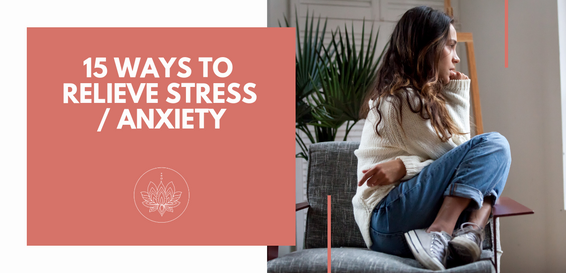Did you know that 70% of adults in the US say they feel stress or anxiety daily? Of course you do, because you’re most likely part of that 70% or know someone who is. Anxiety can lead to low self-esteem, a stomach full of knots, and a decrease in your general wellbeing.
Furthermore, there’s a difference between experiencing stress from time to time and constantly feeling anxious. If anxiety is beginning to take it’s toll like described above, we at Mind and Body Counseling Associates, Reno, Nevada, have listed some ways below to relieve it:
1. Exercise
First and foremost, exercise is one of the main ways to confront stress / anxiety. Here are a few reasons why:
- It reduces stress hormones
- Exercise helps you sleep better
- It improves self-esteem
These benefits are especially experienced when you exercise regularly, so try to find an exercise sequence or activity you enjoy doing.
2. Supplements
There are many supplements available to help reduce stress and anxiety. Some of the most common ones to consider are:
- Lemon Balm
- Omega-3 fatty acids
- Ashwagandha
- Green tea
- Valerian
- Kava kava
Be sure, however, to consult with your doctor before taking any of these, especially if you have a medical condition.
3. Candles
Aromatherapy, i.e.: making use of essential oils or burning a scented candle, is also a popular method employed to ease stress and anxiety. The following scents are especially soothing:
- Lavender
- Rose
- Vetiver
- Bergamot
- Roman chamomile
- Neroli
- Frankincense
- Sandalwood
- Ylang yang
- Orange / orange blossom
- Geranium
4. Caffeine
It’s a well-known fact that high doses of caffeine (found in coffee, tea, chocolate, and energy drinks) can cause increased anxiety. While everyone has different tolerant levels when it comes to caffeine, it’s important to know yours and decrease your caffeine intake if you find it makes you more anxious.
5. Write
Writing things down is another good way to handle stress. While you may want to jot down what is stressing you, you could also write about what you’re grateful for. Showing gratitude forces you to focus on the good things in your life which may help reduce stress and anxiety.
6. Friends and Family
Isolation, in general, is not healthy, but especially if you are feeling stressed or anxious. What’s more, having a friend and family support systems makes you feel like you belong and improves your self-worth. Be sure to talk to to someone you trust about your feelings of anxiety. This can also help take the weight off.
7. Laugh
It’s next to impossible to feel anxious when you are genuinely laughing, and it’s good for your health! Laughing not only reduces stress, but also relieves tension in your body and can improve your immune system in the long run.
8. Say No
While not all causes of your stress or anxiety are within your control, some are. So, try to take control of those. One way of doing this is to say ‘no’ more frequently. Learn to be selective about what you take on in order to avoid feeling overwhelmed.
9. Procrastination
A further way to stay in control of your stress levels is to stay on top of your to-do list and avoid procrastinating. Procrastination can result in you having to act reactively, which can cause stress. Organise your to-do list starting with the most important tasks, assign realistic deadlines, and then make your way down the list. Also try to avoid multitasking as this can also lead to anxiety.
10. Mindfulness
Mindfulness involves taking part in activities which make you hyper-aware of your current state. The act of mindfulness can help confront negative thinking, which often leads to stress and anxiety.
Click here for a list of the the top 7 meditation apps in 2018.
11. Cuddle
Positive physical contact, such as cuddling, kissing, hugging, and sex can help reduce anxiety. This is as a result of an increase in oxytocin and a decrease in cortisol, both of which help to reduce blood pressure and lower your heart rate.
12. Music
Listening to music can be a great way to relax. Slow-paced instrumental music, or nature sounds, in particular, can help to reduce blood pressure and lower your heart rate, subsequently decreasing stress hormones.
13. Breathing
As you may or may not know, anxiety triggers your sympathetic nervous system, which forces your body to go into ‘fight-or-flight’ mode. In this mode, stress hormones are released, which results in an increased heart rate, faster breathing, and tightened blood vessels.
Deep breathing, on the other hand, helps to trigger your parasympathetic nervous system, which causes the body to relax. Breathing in deeply through your nose, and out through your mouth, helps to lower your heart rate.
14. Pets
Owning a pet can also help relieve feelings of stress and anxiety. Once again, when you interact with a pet, your body releases oxytocin, which improves your mood.
15. Positivity
Finally, maintaining positive thought patterns, as well as self-talk, is also very important when it comes to combatting stress and anxiety. When feeling anxious, try the following self-talk phrases:
- “This feeling will pass”
- “I will get through this”
- “I am feeling anxious now, but I have the power to make myself calm”
If you are still struggling with stress / anxiety after trying the above, or you’d still like help over and above these remedies, please don’t hesitate to reach out to us here.


